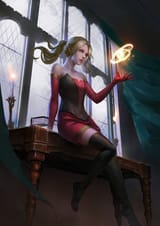Anonymous
10/12/2025, 1:24:44 AM
No.96734153
>>96734265
>>96734318
>>96734329
>>96734351
>>96734415
>>96734547
>>96734868
>>96734873
>>96735294
>>96738297
>>96739258
>>96747660
>>96748134
>>96765279
Class-based RPGs and the "generic wizard who does generic magical things" class concept
Do you think that class-based RPGs should try to accommodate the "generic wizard who does generic magical things" class concept, or do you think it is too generic an idea, and that the game should force the player to narrow it down?
Putting aside the very obvious example of D&D 5(.5)e and its wizard class, D&D 4e, Pathfinder 2e, and 13th Age 2e all have a wizard that specializes in a mix of raw damage blasting and hard-control debuffs (with the occasional buff). Daggerheart likewise has a wizard class. An indie title, level2janitor's Tactiquest, has the Arcanist as a catch-all magical caster with a broad repertoire of spells suitable for different occasions.
Other games have a different approach. Draw Steel has the elementalist, focused on the physicality of elemental magic; and the talent, a psionicist who specializes in more intangible effects like time manipulation and telepathy. Tom Abbadon's ICON has no "generic wizard who does generic magical things" in its noncombat classes or its combat classes, specifically to force the player to narrow the concept down, whether for noncombat functions or for tactical combat role.
Putting aside the very obvious example of D&D 5(.5)e and its wizard class, D&D 4e, Pathfinder 2e, and 13th Age 2e all have a wizard that specializes in a mix of raw damage blasting and hard-control debuffs (with the occasional buff). Daggerheart likewise has a wizard class. An indie title, level2janitor's Tactiquest, has the Arcanist as a catch-all magical caster with a broad repertoire of spells suitable for different occasions.
Other games have a different approach. Draw Steel has the elementalist, focused on the physicality of elemental magic; and the talent, a psionicist who specializes in more intangible effects like time manipulation and telepathy. Tom Abbadon's ICON has no "generic wizard who does generic magical things" in its noncombat classes or its combat classes, specifically to force the player to narrow the concept down, whether for noncombat functions or for tactical combat role.




